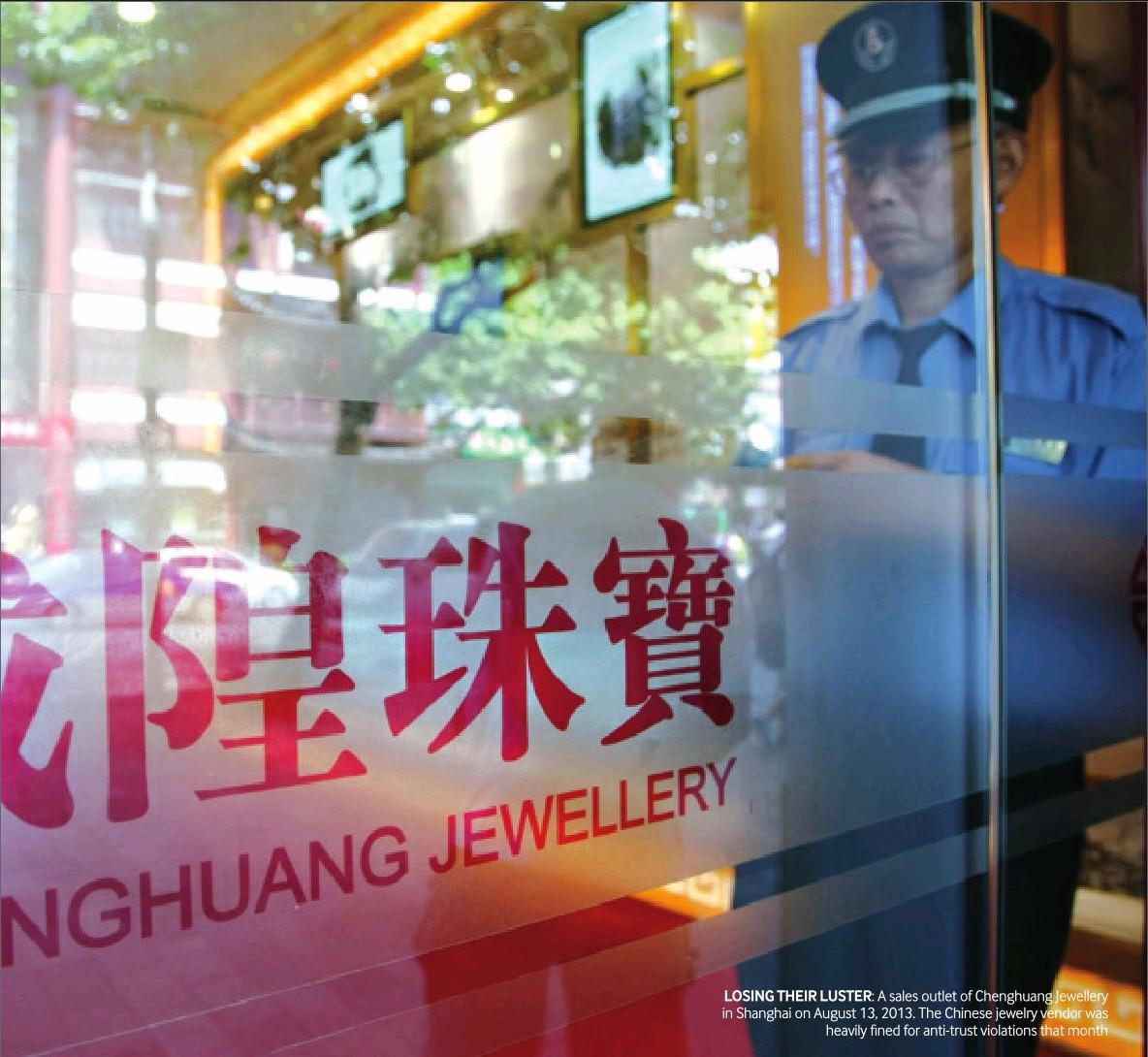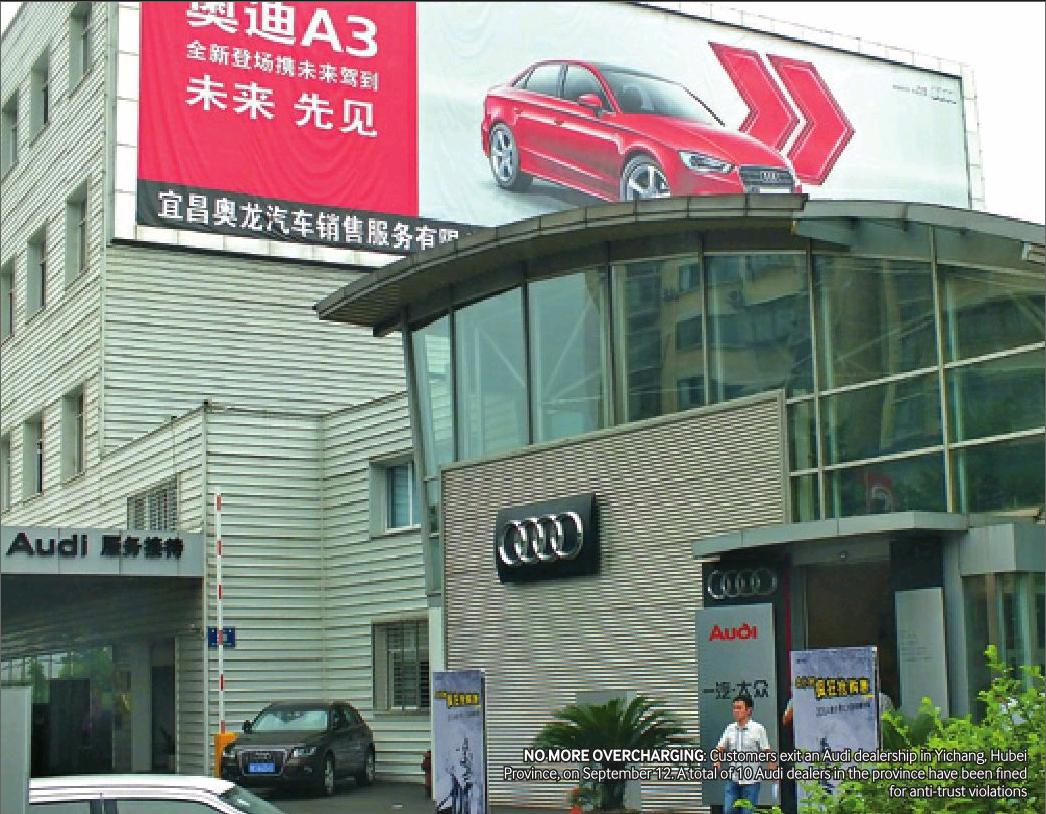Trust Issues
2014-10-23ByZhouXiaoyan
By+Zhou+Xiaoyan


As China continues to launch wave after wave of anti-trust probes in a broad range of industries covering all types of businesses—state-owned enterprises (SOEs), private businesses and foreign-funded firms, concerns that foreign businesses have been disproportionately singled out during the antitrust campaign are gradually losing foothold.
In response to Chinese consumers longstanding complaints that they have been overcharged when purchasing cars, auto parts and maintenance services, authorities have launched anti-trust investigations into carmakers involved in suspect activity. On September 11, the FAW-volkswagen Sales Co., together with seven dealers of its luxury brand, Audi, were fined heavily. The same day, Chrysler Group China Sales Ltd. and three of its dealers were also held subject to financial penalties.
Chinese anti-trust investigators have descended on Qualcomm, Microsoft, Mercedes, Audi, BMW and Japanese auto part makers in a wave of high-profile cases over recent months.
On the other side of the equation, law enforcement departments have been equally tenacious in pursuing domestic firms that have violated the law, although punishments meted out to domestic businesses havent been so widely reported as those given to foreign big names.
For instance, at the beginning of September, three Chinese cement com- panies were fined 114 million yuan ($18.5 million) in total for manipulating prices and reaching price-fixing agreements. Also this month, 23 Chinese insurance firms and the Zhejiang Insurance Industry Association were fined more than 110 million yuan ($17.8 million) for anti-trust violations.
When the Anti-Monopoly Law of the Peoples Republic of China initially came into force in 2008, Chinas first move was to target large domestic enterprises, as was the case in the investigations against telecom operators China Unicom and China Telecom in 2011. In 2013, five Chinese jewelers and two Chinese premium liquor makers were heavily fined for price fixing.
“Only 10 percent of the companies being probed by Chinese anti-trust authorities are foreign enterprises,” Chinese Premier Li Keqiang said on September 9 during the Eighth Summer Davos in Chinas northern metropolitan city of Tianjin, dismissing the speculation that foreign businesses are being targeted. “Chinas door has opened, and it will never be closed again,” Li added.
He said that an increase in the number of probes is a result of improved law enforcement.“We have improved the transparency of government supervision to restore the fairness of the market,” he said. “But some of our efforts have been misinterpreted.”
Li said that the supervision efforts, including anti-trust probes, are legal, transparent and fair, and that they will benefit Chinas opening-up programs and make more foreign investors willing to come to China in the long run.
impartial treatment
Chinas Anti-Monopoly Law was enacted with the purpose of preventing and stopping monopolistic behavior, ensuring fair market competition, improving efficiency in the economy, and protecting public interests. The law became effective after Chinese authorities spent more than a decade drafting the legislation and consulting with foreign competition authorities from the United States, the EU and other jurisdictions.
The law is enforced by three regulators in China—the Ministry of Commerce (MOFCOM) enforces merger provisions; the State Administration of Industry and Commerce (SAIC) focuses on non-price related actions; and the National Development and Reform Commission (NDRC) takes on pricing monopolies.
The anti-trust law states that businesses engaging in monopolistic behavior will be fined 1 percent to 10 percent of their annual sales revenues. Punishments vary depending on the nature, severity, and duration of the violations and how cooperative the companies in question are with law enforcement.
Xu Kunlin, Director General of the Bureau of Price Supervision and Anti-Monopoly under the NDRC, said Chinas three anti-trust regulators have fewer than 100 staff members altogether.
“With such a small team, our investigations mainly follow public reports, so they are selected by consumers,” said Xu, amid some foreign companies complaints that they fall victim to “selective enforcement” of anti-monopoly probes in the country.
“Some of the NDRC monopoly investigations involve overseas multinationals, but that does not mean that we are specifically targeting only them,” he said. “As a law-enforcement agency, we treat local and overseas companies equally to ensure justice for all. This is the spirit of the law, and the principle we always adhere to in the process of enforcing the law.”
“Some business operators in China have failed to adjust their practices in accordance with the anti-trust law. Others have a clear understanding of the law but they take the chance,” Xu told Xinhua News Agency.
Xu said the NDRC has always ensured that the defendants can make statements, seek hearings and legal redressal during the course of anti-trust enforcement.
“For example, in an auto parts price-fixing case, Sumitomo from Japan filed a written statement which was accepted by the NDRC. We reduced the fine from 342.72 million yuan($55.8 million) to 290.4 million yuan ($47.3 million),” Xu said.
Shi Jianzhong, a law professor at the China University of Political Science and Law, said that it is groundless to accuse China of using anti-trust investigations against foreign businesses.
“Since the law was enacted six years ago, investigations have covered state-owned, private as well as foreign businesses. They are all equal in the investigations. No company can escape punishment once it violates the law,” he said.
Shen Danyang, a MOFCOM spokesman, said the recent anti-monopoly investigations concerning a number of foreign companies are intended to promote fair competition and protect consumers rights.
“Probes on monopolistic behavior are universal practice. Companies in China, no matter whether they are domestic or foreign, must bear the burden of legal consequences if they violate Chinese laws,” Shen said.
Harley Seyedin, President of the American Chamber of Commerce in South China, said he believes that Chinese laws will treat domestic and outside businesses equally. He said the ongoing anti-trust probes will not affect his member companies future investment in China.
“While in China, you have to respect and follow laws and regulations in China,” he told Beijing Review. “There are no so-called ‘foreign businesses in China. Once you come here as a foreign company, you establish a Chinese company that is subject to Chinese laws, that pays Chinese taxes and that acts as a Chinese citizen.”
“It doesnt matter whether those companies are U.S.-invested or not, we would expect those companies to respect and follow Chinese laws, just as all companies in the United States should follow U.S. laws,” he said.
“If you only come to China for its cheap land and labor and a lax law enforcement environment, then youre not welcome,” he said.
Wang Xiaoye, a law professor at the Chinese Academy of Social Sciences who has participated in the drafting of Chinas anti-trust laws, said the law is modeled on EU legislation. Wang said there is nothing alien or unique about the countrys anti-trust law.
She said it is less draconian than in other jurisdictions, particularly the United States, where offenders can go to jail and often do, since it is a violation of criminal law. As is the case in the EU, violations of Chinas Anti-Monopoly Law are a civil matter.
“What has happened in China recently represents normal practice everywhere,” she said.
“Foreign companies that feel wrongfully accused of anti-competitive behavior should take their cases to Chinese courts,” she said. “If they feel confident that everything they have done is right and they have not violated the law, they can bring their cases to the courts,” she said.
The end of an era
Experts say foreign businesses in China should get used to the fact that the age of supernational treatment for foreign players has come to an end in the country and China is getting serious about creating a fair market.
In the early years of reform and opening up, in order to lure foreign investment, local governments used to offer foreign businesses a number of preferential policies on land and taxes. But now, although China still attaches great importance to foreign investment, the “supernational treatment” for foreign businesses has come to an inevitable end.
Zhang Jianping, a senior researcher at the Institute for International Economic Research at the NDRC, said foreign companies are still in an “adjustment period” to a more stringent enforcement of anti-trust law as enforcement has been somewhat lacking in previous years.
Chinese officials have urged companies operating in China, domestic and foreign, to review their operations to see if their practices fully abide by the anti-monopoly legislation.
Huang yong, Director of the Competition Law Research Center at the Beijing-based University of International Business and Economics, said most foreign companies have rich experience in addressing anti-trust issues, but they need to gain a better understanding of Chinas anti-trust laws.
“Closer communication with Chinese regulators should be highlighted,” Huang said.
Bai Ming, a research fellow with the Chinese Academy of International Trade and Economic Cooperation, said intensified enforcement of the Anti-Monopoly Law will become a new norm in China. He said in the future, anti-trust probes will become more and more frequent in China and all businesses should get used to it.
“In the past, regulators only targeted businesses that have severely breached the law due to defective law enforcement and systems,”Bai said. “However, after six years accumulation of experience, Chinas law enforcement has greatly improved. The enforcement of anti-trust legislation is aimed at maintaining market order and sustaining a fair market environment, in order to better protect consumer rights.”
The wave of anti-trust investigations has to date swept a wide range of sectors, such as LCD manufacturers, milk formula makers, pharmaceutical factories, liquor makers, auto makers, insurance companies and cement producers.
Wu Gangping, Chairman of Ernst & young Great China, said the business environment in China has not deteriorated. “A large number of people flock to China to invest, which means they still have plenty of money to make.”
According to Wu, although land and labor costs have risen in China, the country has a huge market, where manufactured products can be sold. He pointed to the fact that in recent years, a complete supply chain has been formed in China with locally based clients and suppliers. Also, China has a much more stable political environment than many other coun- tries, Wu argued.
Wu said the recent year-on-year decline in FDI inflow into China has nothing to do with anti-trust investigations.
“FDI inflow in China has been at a very high level for a long time, ranking second in the world only to the United States. We cant expect FDI to be that high forever. Although there has been a decline, the total amount of investment is still relatively very high,” Wu said.
“Chinas economic development used to rely on foreign investment and exports. Therefore local governments used to offer preferential policies to foreign businesses. China is not what it used to be in the 1980s. Therefore, domestic policies have changed accordingly,” he said.
